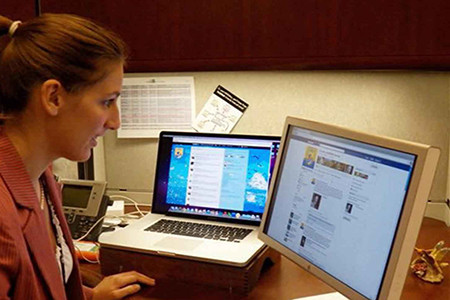Forget the late-night trips to the campus library. Google is working with libraries at four colleges, as well as the New York Public Library, to digitize books in their collections in order to allow access to content via Google Print. The schools include Harvard University, Stanford University, Oxford University and the University of Michigan. The scanning process will begin with out-of-copyright content and some brief excerpts of copyrighted materials, as well as some basic bibliographic information. The full text of copyrighted works is not currently available.
A similar program, Google Scholar, began at more than 100 colleges and universities in December 2004. Using the Google Scholar search engine, students can get more direct access to library materials on their campus. Search results include direct links to online copies of works and information on where to find printed works in the library’s collection. Although the company is still working out the kinks, librarians – and no doubt students – are praising the service.
DON’T LET YOUR EMAIL ADDRESS RUIN YOUR COLLEGE APPLICATION
Just because your friends think your email address is clever doesn’t mean the college admissions reps will. Sure, you’re smart enough to keep that [email protected] off your official application, but what about all the forms you’re filling out just to request information on schools? Don’t incorrectly assume that your request for college packets is just going to a clearinghouse mail order company – some are passed on to the colleges themselves.
With plenty of options for free email accounts, there’s no excuse to not have at least one simple, DECENT address. You never know who’s looking.
COLLEGES AND UNIVERSITIES EMBRACE PODCASTING TREND
Move over blogging, there’s competition on campus.
Podcasting is the hottest communications trend to hit colleges and universities this year. Started in 2004 by former MTV star Adam Curry, podcasts (essentially audio versions of blogs) are informal and short thoughts from an individual or group on a particular subject. Subscribers use a podcast receiver to listen to any of the more than 3,500 podcasts currently available – most of which are crude in production. Already, industry experts estimate that some 6 million people are downloading and listening to podcasts.
So just how are podcasts being used at institutions of higher learning?
- At McMaster University in Ontario, Canada, the engineering faculty has created Radio Fireball, a 20-minute podcast detailing campus life, to attract potential engineering students. Featuring interviews with students and professors, audio tours of local hotspots, profiles of the university’s facilities, and music by local bands, the broadcasts offer listeners a taste of “real” college life– before they step foot on campus.
- At Michigan State University, football fans can subscribe to “The Enlight-ened Spartan” to hear the real skinny on Michigan State football.
- Oregon State University’s “Grassroots Learning Project” podcast offers a series of interviews with the assistant to the Dean for Technology in the new School of Education.
- Drexel University in Philadelphia broadcasts seminars and interviews from the College of Arts and Sciences.
- An economics professor at the School of Business Administration at the University of South Carolina Upstate broadcasts “Dr. Reese’s Economics Podcast.”
- The podcast from Allegheny College in Meadville, Pa. has covered everything from students’ favorite Star Wars memories and sports to alumni reunions and technology training.
To learn more about podcasting or to search for podcasts by category, visit www.podcastingnews.com.



